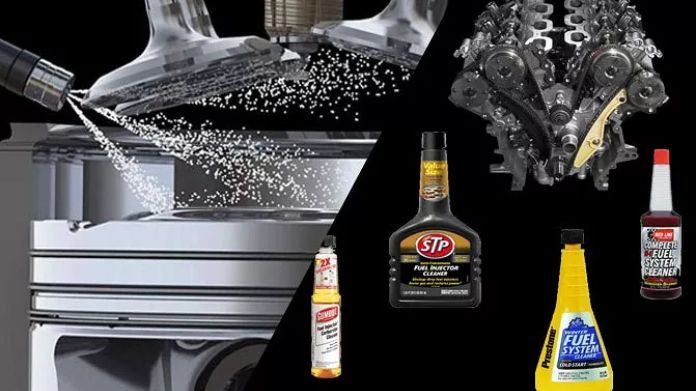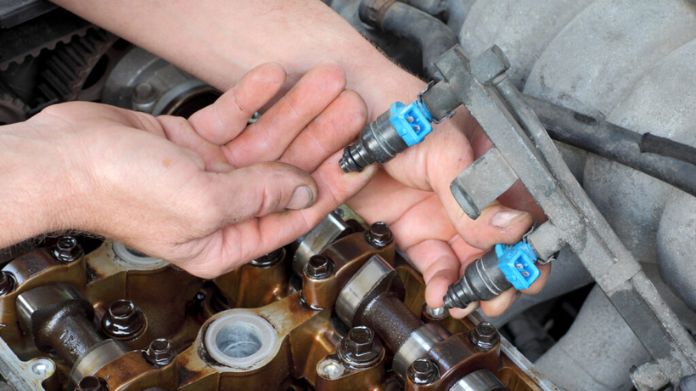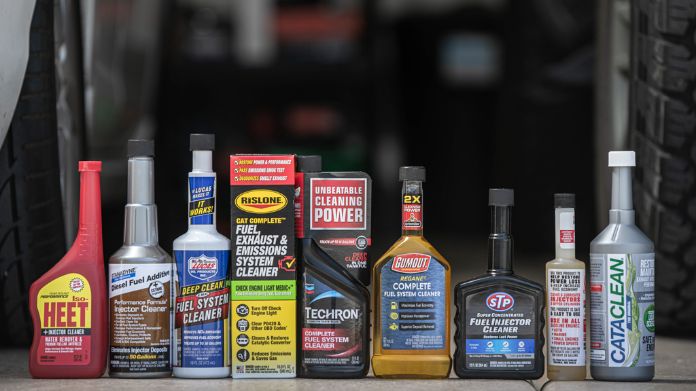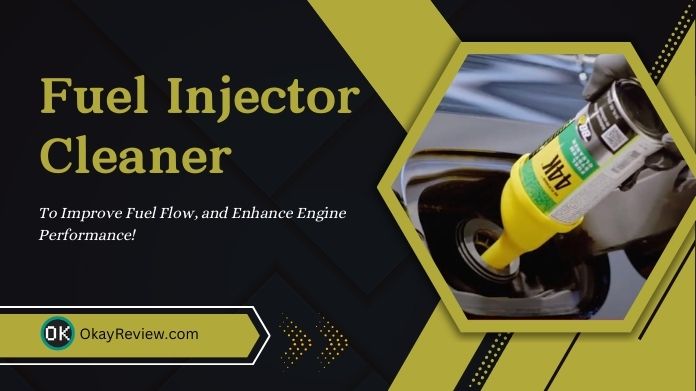Have you ever noticed your car feeling sluggish or your fuel efficiency taking a dip? If so, you might have heard about fuel injector cleaners as a potential solution. But do they really work, or are they just another automotive myth?
It’s normal to question whether the numerous items on the market that claim to improve performance and clean your fuel system are worth your time and money.
In this article, we’re diving deep into the world of fuel injector cleaners to uncover the truth. Do they actually work? What do they do inside your engine? And most importantly, should you be using one?
Let’s break it down and find out!
Table of Contents
What is a Fuel Injector Cleaner?
 Before we get into whether it works, let’s first understand what they are. A fuel injector cleaner is a liquid additive that you pour into your fuel tank.
Before we get into whether it works, let’s first understand what they are. A fuel injector cleaner is a liquid additive that you pour into your fuel tank.
It’s designed to clean out the deposits and build-up that accumulate over time inside your fuel injectors. These injectors are responsible for spraying fuel into your engine at the right time and in the right amount.
When they get clogged with dirt, carbon, or other debris, your engine can struggle with performance issues like rough idling, misfiring, and poor fuel economy.
The idea behind a fuel injector cleaner is simple: dissolve the gunk and allow the fuel to flow freely again, restoring your car’s performance.
How Do Fuel Injector Cleaners Work?
Once you pour the cleaner into your gas tank, it mixes with the fuel and gets carried through the entire fuel system.
As the fuel travels, the active ingredients in the cleaner break down carbon deposits and other impurities that might be clogging your fuel injectors.
Some cleaners also contain detergents that help keep the fuel lines, intake valves, and combustion chamber clean.
A few key ingredients often found in fuel injector cleaners include:
- Polyetheramine (PEA): This is considered the most effective ingredient for breaking down stubborn carbon deposits.
- Polyisobutylene (PIB): Helps remove moisture and prevents fuel from gelling.
- Polyisobutylene amine (PIBA): Works well for removing softer deposits and maintaining system cleanliness.
By using these additives, fuel injector cleaners can help your car run more smoothly and efficiently. But do they always work as advertised?
Let’s take a closer look.
Do Fuel Injector Cleaners Really Work?
 The short answer is yes but with some conditions. Fuel injector cleaners can be effective, but their success depends on several factors, including how dirty your fuel system is and what type of cleaner you’re using.
The short answer is yes but with some conditions. Fuel injector cleaners can be effective, but their success depends on several factors, including how dirty your fuel system is and what type of cleaner you’re using.
If your car is relatively new and well-maintained, you might not see a dramatic improvement after using a cleaner.
However, if your vehicle has high mileage or has been neglected in terms of maintenance, a good quality fuel injector cleaner can make a noticeable difference.
Here are a few signs that your car might benefit from a fuel injector cleaner:
- Reduced fuel efficiency
- Rough idling or engine hesitation
- Difficulty starting your car
- Increased exhaust emissions
- Sluggish acceleration
If you’re experiencing any of these issues, a fuel injector cleaner could be worth a try before heading to a mechanic for more expensive repairs.
When Should You Use a Fuel Injector Cleaner?
Experts generally recommend using a fuel injector cleaner every 3,000 to 5,000 miles, depending on your driving habits and the quality of fuel you use.
If you frequently drive in stop-and-go traffic, take short trips, or use lower-quality gasoline, your injectors might accumulate deposits more quickly.
Some situations where using a fuel injector cleaner makes the most sense include:
- Before a long trip: Ensuring your engine runs smoothly without hiccups.
- If you’ve noticed performance drops: It’s an easy and affordable first step.
- Routine maintenance: Adding it as part of your regular car care routine.
Choosing the Right Fuel Injector Cleaner
 Not all fuel injector cleaners are created equal. Some contain stronger detergents and better formulations that deliver better results.
Not all fuel injector cleaners are created equal. Some contain stronger detergents and better formulations that deliver better results.
When choosing a cleaner, consider the following:
- Check for PEA content: Products containing Polyetheramine (PEA) are generally more effective at removing tough deposits.
- Read reviews: See what other drivers with similar vehicles have experienced.
- Follow your car manufacturer’s recommendations: Some brands suggest specific types of cleaners.
Popular and trusted brands include:
- Chevron Techron
- Sea Foam
- STP Fuel Injector Cleaner
- Liqui Moly
DIY vs. Professional Fuel System Cleaning
While fuel injector cleaners are a great preventive measure and can help with minor issues, they might not be enough for severe build-up.
If you’ve tried using cleaners and are still experiencing problems, it might be time to consider a professional fuel system cleaning.
Professional cleaning involves specialized tools and stronger cleaning agents that can tackle even the toughest carbon deposits. Although it’s more expensive, it can be worth it if your fuel injectors are heavily clogged.
Should You Use Fuel Injector Cleaner?
If you’re looking for an easy and affordable way to maintain your car’s fuel system, using a fuel injector cleaner is a good idea.
It can help prevent problems, improve fuel efficiency, and extend the lifespan of your engine components. However, it’s not a magic fix for every issue. If you’re facing serious engine troubles, it’s always best to consult a mechanic.
The key takeaway is that fuel injector cleaners do work, but they work best when used as a preventive measure rather than a cure-all for major fuel system issues.
Therefore, get a bottle from a reliable brand and give it a try if you haven’t before. Your vehicle may reward you for improved fuel efficiency and easier operation.
Closure
Fuel injector cleaners can be a helpful addition to your car maintenance routine, especially if you’re experiencing minor performance issues. They are easy to use, affordable, and can make a difference when used correctly.
Just keep in mind that they cannot take the place of routine upkeep and expert treatment when required.
Have you ever cleaned your fuel injectors? Have you seen any progress? Share your experiences and tips in the comments below!


Fantastic article! Your deep dive into whether fuel injector cleaners work was both informative and easy to understand. I appreciate the clear explanation of how these cleaners function and when they’re truly beneficial. This is a must-read for anyone looking to maintain their vehicle’s performance. Keep up the great work!